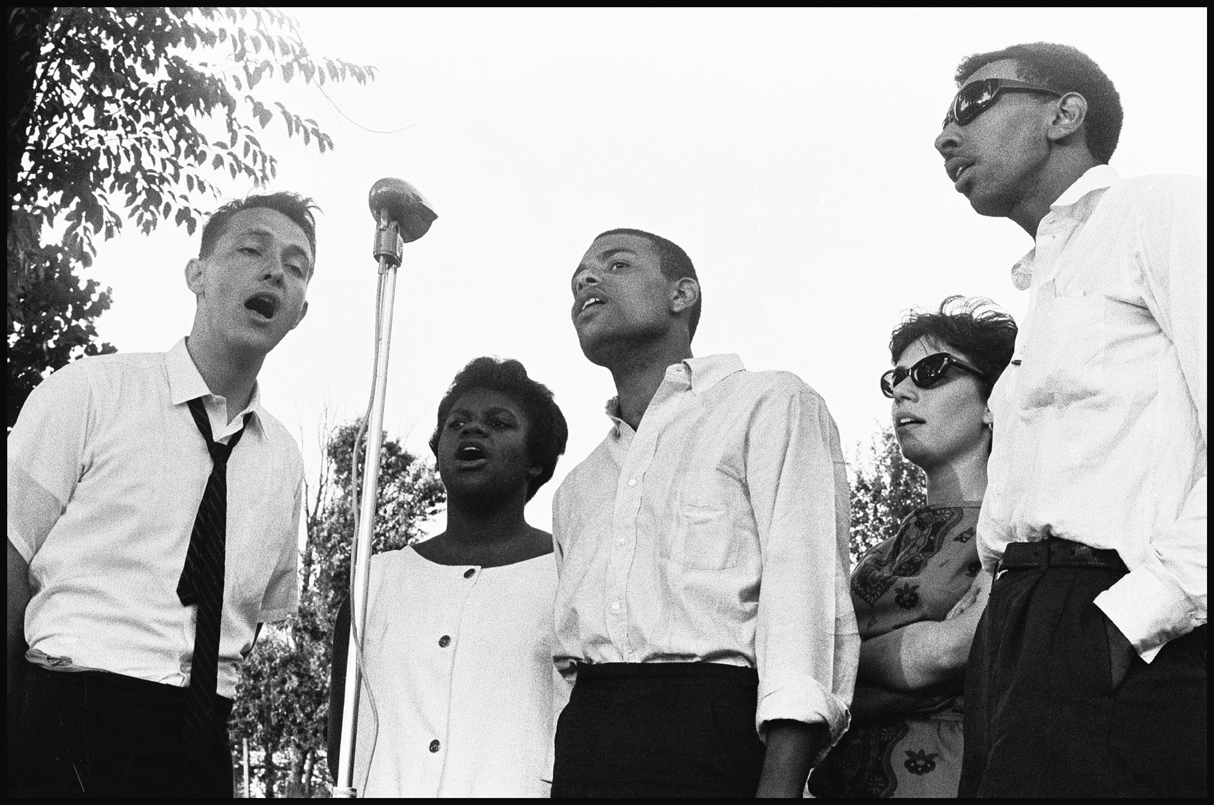Dorothy Zellner
January 14, 1938 –
Raised in New York City, New York

Dottie Miller gives affidavit to James Forman after losing shoes to high-pressure fire hoses in Danville, Virginia, June 1963, Danny Lyon Memories of the Southern Civil Rights Movement 64, dektol.wordpress.com
“Can you type?” SNCC executive secretary Jim Forman asked Dorothy “Dottie” Miller shortly after she walked into the SNCC office on Auburn Avenue in Atlanta, Georgia. (She later married SNCC’s Bob Zellner, becoming Dottie Zellner.) Although she had come to Atlanta to join SNCC, she had not heard back and had instead spent the last five months working at the Southern Regional Council (SRC). As she remembered, “the more stories I read about the heroic actions of SNCC workers, the more awed I became. The more awed I became, the shyer I was.” Within a matter of months, however, Zellner went from “being afraid to walk twenty minutes to the SNCC office to being a full-fledged staff member in an organization I loved.” Zellner was 22-years-old at the time, and she would ultimately spend the next 22 years of her life in the South.
Zellner was born and raised in New York City. The child of immigrant Jewish leftists, her parents taught her about Black history and the need for racial justice. She grew up hearing stories of Jewish resistance to Nazi fascism. Zellner’s parents supported her move to Atlanta, and it came as no surprise when years later, Zellner’s father proudly passed around a press clipping of his daughter in jail.
After graduating from Queens College and inspired by the sit-in movement, Zellner first went South in 1960 to attend a CORE workshop. She later helped plan and orchestrate New Orlean’s first sit-in. Many of Zellner’s friends at CORE would speak “incessantly” about an organization run completely by young people. This organization was SNCC.
As a staff member in the Atlanta office, Zellner would type reports from SNCC field secretaries who had accompanied disenfranchised Black people to vote in rural parts of Georgia and Mississippi. She would type, word for word, as field secretaries such as Curtis Hayes, Willie Peacock, Sam Block, and Hollis Watkins described similar narratives of mobilizing Black people to register–enduring intimidation, violence and sometimes arrest in the process–while rarely ever successfully registering a person to vote. SNCC used these reports to help build a national network for Friends of SNCC groups in northern cities and college campuses throughout the United States and also as a means to pressure the federal government to guarantee the Black franchise. Dottie Zellner also worked with SNCC Communication Director Julian Bond on press releases and articles for The Student Voice.
Zellner felt comfortable as a white person in a Black-led organization and felt that SNCC represented the ideal of a “beloved community.” As a Jew in the South, however, she found very little support for her work. The southern Jewish community felt their position was “already insecure” and tenuous.

Bob Zellner, Bernice Reagon, Cordell Reagon, Dottie Miller (Zellner), and Avon Rollins singing in Danville, Virginia, June 1963, Danny Lyon, Memories of the Southern Civil Rights Movement 66, dektol.wordpress.com
In the fall of 1963, Zellner moved to Cambridge, Massachusetts with her then husband, Bob Zellner, to run the Northeast Regional Office of SNCC. She traveled to colleges and universities throughout the northeast region to recruit student volunteers for the Mississippi Freedom Summer Project of 1964. During Freedom Summer, Zellner worked in the Greenwood, Mississippi office, answering calls from civil rights workers who had been beaten, arrested, or had disappeared, thereafter alerting local authorities, the press and family members.
It was after the betrayal of the Freedom Democratic Party at the Atlantic City Convention that Zellner first began hearing discussion within SNCC of becoming an all-Black organization. “I remember hearing this for the first time and simply could not conceive of my life without SNCC,” she remembered. By the winter of 1967, most white people had left SNCC, but she and Bob Zellner, made one final attempt to remain in SNCC. The Zellners understood the need to live and organize among the white community but wanted to continue doing this work as SNCC staff members in an interracial community. The Zellner’s request to remain in SNCC was denied.
The couple moved to New Orleans in 1968. They began leading Project Grow (Grass Roots Organizing Work), an effort aimed at undermining racism in the working-class white community. “For me, probably the hardest consequence of leaving SNCC was the subsequent breach between many black and white SNCC people, years of distance and chilly separation. But this has changed. Now, so many years later, we are often together, and when this happens, when I am with other SNCC people, I feel a kind of joy–a feeling of being, at last, complete,” Zellner explained.
Zellner moved back to New York in 1983 and still remains active in feminist causes and is also involved in advocacy work on behalf of Palestinians.
Sources
John Dittmer, Local People: The Struggle for Civil Rights in Mississippi (Urbana: University of Illinois Press, 1994).
James Forman, The Making of Black Revolutionaries (Seattle: University of Washington Press, 1997).
Judy Richardson, “SNCC: My Enduring ‘Circle of Trust,’” Hands on the Freedom Plow: Personal Accounts by Women in SNCC, edited by Faith S. Holsaert et al. (Urbana: University of Illinois Press, 2010), 348-365.
Dottie Zellner, “My Real Vocation,” Hands on the Freedom Plow: Personal Accounts by Women in SNCC, edited by Faith S. Holsaert et al. (Urbana: University of Illinois Press, 2010), 311-326.




